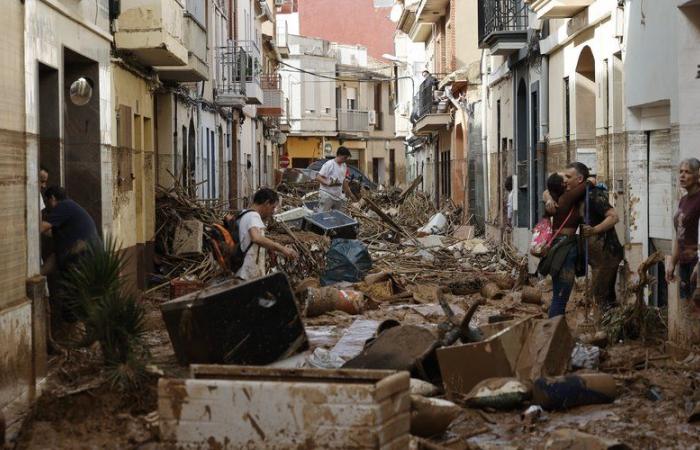
In Paiporta, a martyred town of 25,000 inhabitants, with at least 62 dead, there is desolation among the inhabitants who lost everything after the record rains. In the streets, the scars of the disaster are visible: debris, overturned, crushed cars… While the toll, at least 158 dead, continues to rise. Reporting.
They have been walking on the side of the expressway for more than an hour with a bag on their back. Their clothes are partly covered in mud. Txelo and Jose Enrique try to reach downtown Valencia to take refuge with relatives.
Their pavilion in Paiporta is inaccessible. “There are seven vehicles on top of each other blocking the entrance. This morning, a crane is removing the cars. But we won't get into the house for 2 or 3 days”explains the father of three children.
This family is one of the victims of Paiporta, on the southern outskirts of Valencia, which became the epicenter of the disaster. In this town of 25,000 inhabitants, more than 50 people died. And the toll is likely to rise as soldiers from the army emergency unit were still trying, Thursday, to find the bodies of victims using sniffer dogs.
“They still haven't managed to get into the retirement home. It's horrible,” testifies Tchelo, with tears in his eyes after 48 hours without or almost no sleep.
The emotion is palpable, the anger too. “We received the alert messages on our cell phone Tuesday evening when we already had water everywhere. We had already saved a woman with her two babies, a man locked in his car. And that's when- there the civil protection alarms sounded?? But it was too late. It was too late for those who were already dead!
“People should never have gone to work on Tuesday”
Did the regional authorities react too late? This is the opinion shared by many disaster victims. “I am angry with the president of our region: he minimized the warnings from the weather agency”explains Santiago, a young retiree whose ground floor of the house is completely flooded.
“People should never have gone to work on Tuesday. It was often when they returned home at the end of the day that they were trapped in their vehicle”deplores Maria, another resident of Paiporta. The Spanish weather services had sent several messages on social networks as of Tuesday morning.
But for the victims, the regional government of Valencia, led by the right-wing Popular Party, took these warnings lightly. Without electricity, without water Without electricity and without water, Paiporta was still isolated on Thursday. Only emergency vehicles and firefighters were able to enter the city.
The floods left a landscape of apocalypse with hundreds of vehicles rammed against each other, mud everywhere, walls torn away and houses gutted.
“The ground floor and garage are completely flooded” explains Maria, at the door of her house. We are in shock. We are trying to remove the mud. We cleared the sidewalk to be able to pass. But we have no water, no electricity. We can't call anyone because the phones aren't going through.”
“I can see this before my eyes and I don’t believe it”
All day, hundreds of residents walked to Paiporta equipped with food, brooms and buckets, to come and help. “I have come to help my brother. His house is flooded. But thank God, he is alive. Not everyone has been so lucky, raconte Santiago, a shovel in hand. Everything is destroyed. It's crazy. I can see it before my eyes and I don't believe it.”
Everyone was overwhelmed by the violence of the storm, the effects of which are compared in Spain to those of an earthquake.“But the authorities should have done more,” regrets José Enrique.
“No one came to see us. No one said anything to us, or came to bring us food or a package! We've been trying to survive for two days.”





